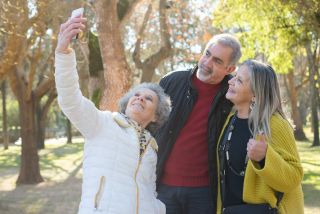Relationships
Does Life Get More Fun as You Age?
Research reveals 12 amazing benefits of getting older.
Posted March 18, 2023 Reviewed by Abigail Fagan
Key points
- Many young and middle-aged adults assume that old age is an unhappy time. This stereotype is not supported by research.
- Contrary to the stereotypes, older adults are generally happier and more mentally stable than other age groups.
- Aging brings numerous other benefits, such as choice, creativity, and personal development, that have been verified by research.

I recently read the following quote in a magazine under the heading, Wit and Wisdom: “If you don’t have fun in your 20s, you’re never going to have fun. Life does not get more and more fun.” —Fran Lebowitz
I usually enjoy the wry humor of Fran Lebowitz, but this particular quote demonstrates neither wit nor wisdom. Unfortunately, many 20-somethings, along with children, adolescents, and middle-aged adults, regularly fall victim to this sort of ageist stereotyping. As a result, they dread getting older, believing that there is nothing to look forward to as they age.
Nothing could be further from the truth! In this post, I’ll reveal 12 wonderful things about aging that young and middle-aged people can anticipate. Most are based on survey research from around the world and not just my personal experience, although I couldn’t resist putting in my two cents here and there.
Why is it important to know the upsides of aging? Psychologist Becca Levy, in her book, Breaking the Age Code, has done massive amounts of research on how our images of aging impact our lifespan and health. Her work demonstrates that those who have positive images of aging live, on average, 7.5 years longer than those who have negative images of aging. Positive images of the older years are also linked to better health, better memory, a lower risk of dementia, and even a faster walking pace. It’s amazing that a positive view of older age can literally put more spring in your step.
Here is a quick summary of 12 major benefits of getting older:
1. You are still alive! Need I say more? Yes, it's better than the alternative.
2. Older people are happier people. Surveys in the U.S. and in countries all over the world repeatedly confirm this counterintuitive fact. As I write in my book on healthy aging, Silver Sparks, “Polls of people…in 149 countries reveal a startling pattern…As they aged, older adults rated their life satisfaction progressively higher, with happiness rating rising gradually and steadily from age 50 through the decade of the 90s.” Life satisfaction IS fairly high in the 20s but not as high as it will be in the years after 60. Aging expert Laura Carstensen confirms that “research shows over and over that older people are happier than the twenty-somethings who are assumed to be in the prime of life.”
3. Older people are mentally healthy people. Carstensen has researched the mental health of older people and asserts that “People over the age of 65 have the most stable and optimistic outlook of all adults.” Emotional regulation also improves as we age, and depression is less common than in midlife (with the exception of the oldest old). A survey from 2016, described here, even found that “People in their 20s and 30s reported having the highest levels of depression, anxiety and stress, plus the lowest levels of happiness, satisfaction and wellbeing. Older people, surprisingly, were the happiest.” Why?
According to writer Jonathan Rauch, author of The Happiness Curve, getting older fosters a “positivity effect,” meaning older people dwell less on life’s downsides, notice positive events more than negative ones, and cultivate the “gratitude attitude.” And life is stressful for young adults. They have multiple responsibilities and life tasks, including learning the skills of independent living, finding an intimate partner, and securing a niche in the working world.
4. Older people have more choices about their work life. Not every older person is fortunate enough to have a strong financial foundation for the post-retirement years. But many seniors can design a retirement with a mixture of work options such as part-time employment, a second (or third) career, volunteer jobs, and/or just replacing work with leisure and fun. Others choose not to retire at all. As Margaret Mead famously said, “Sooner or later I'm going to die, but I'm not going to retire.”
5. Older people can focus on their own creativity and personal development, often for the first time in their life. Retirees can take a Spanish class, join a quilting group, cultivate their carpentry skills, study Greek and Roman history, write their memoirs or a novel—whatever strikes their fancy.
6. Older people have more free time. They can use this time to savor the small pleasures of the day— watching the birds from their kitchen window, exploring their city, taking walks, or just having a cup of coffee with a friend. Or, if more adventurous, they can travel the world and experience other lands and peoples.
7. Older people know themselves. Older adults know their “VITAL Signs”—their values, interests, temperament, activity preferences, life mission, and strengths. Knowing the clock is ticking, they invest their time in things and people of proven importance.
8. Older people are physically healthy. Not that older people are completely free of aches and pains. But according to a 2017 survey by the CDC, summarized here, most older people rate themselves in good to excellent physical health. The specifics: “When asked to rate their overall health, 82% of adults ages 65 to 74 described it as excellent (18%), very good (32%) or good (32%)…. This trend toward positivity is also evident among adults age 75 and older: 73% of this group said their health was excellent (12%), very good (28%) or good (33%), while only 27% gave a fair (20%) or poor (7%) evaluation.” Although over 60% of older adults have two or more chronic illnesses, most rate themselves highly on the health dimension, because they can still do the activities that are meaningful to them.
9. Older people report high quality relationships. Because of shortened time horizons, many older adults prune their friendships and invest their time only in their most significant relationships. The ticking clock motivates others to expand their relationship circles. I count myself in the latter group. My recent relationship experiences have included: Participating in a new friendship group; connecting with old, dear friends every month; visits with cherished relatives; sharing the day’s news with my romantic partner; and the thrill of regular Zoom calls with my granddaughter. Good relationships are a factor in lengthening life, keeping healthy, and staying happy, according to multiple research studies.
10. Older people have a sense of history. You might say, we are history, and I mean that in a good way. It’s amazing to be at the top of the mountain and to look back at, say, 75 years of life in America, with all its changes, good and bad. And shallow though it may be, I love it when the geniuses on "Jeopardy" all miss an answer that everyone my age would know in an instant.
11. Older people have time for true self-care. Retirement or semi-retirement brings opportunities to do all the things we need to do for our health—exercise, eat right, sleep, cultivate relationships, find purpose in our lives, have fun, and more. With fewer responsibilities, we have fewer stressors than the 20-somethings. You want “me time?” Get older.
12. Older people have access to social supports such as Medicare and Social Security. The safety net for older people must be improved and extended, but it does offer some peace of mind that younger adults do not have.
To point out the obvious, not every older person is happy or healthy. Far from it. Chronic illness, losses of friends and family, poverty, loss of maximal functioning—these all take their toll. Others suffer from bad luck, accidents, and genetic diseases. Yet, time and again, in straw polls, few adults over 65 say they would want to be 20 again.
So, if you are young and dissatisfied with your life, know that you have not missed the happiness boat. Contrary to popular belief, life can get more and more fun as you age.
© Meg Selig, 2023. All rights reserved.
References
Lebowitz quote.The Week, March 3, 2023, p. 17.
Polls. Selig, M. (2020). Silver Sparks: Thoughts on Growing Older, Wiser, and Happier. Sierra Vista, AZ: JetLaunch, p. 4.
Levy, B. (2022). Breaking the Age Code. NY: William Morrow.
Mental health. Relationships. Carstensen. L. (2011) A Long Bright Future. NY: Broadway Books, pp. 5, 109.
Straw polls. Rauch, J. (2018). The Happiness Curve: Why Life Gets Better After 50. NY: Picador/St. Martin's Press. Nook edition, pp. 51, 110.




